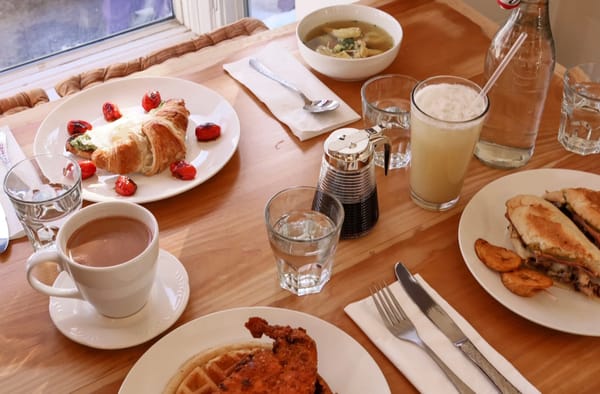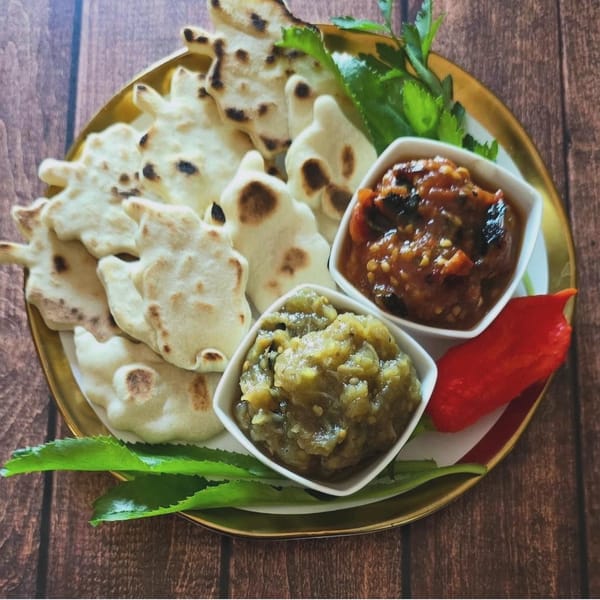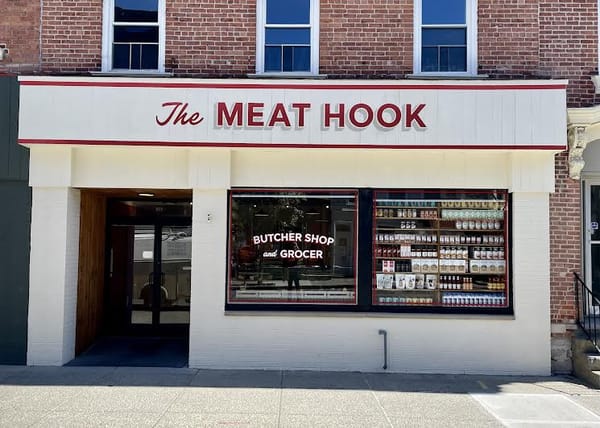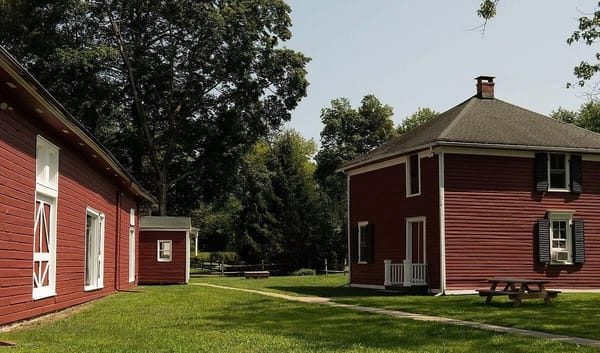AgriCulture bloggers Peter Davies and Mark Scherzer are the owners of Turkana Farms in Germantown, NY. This week Peter writes.
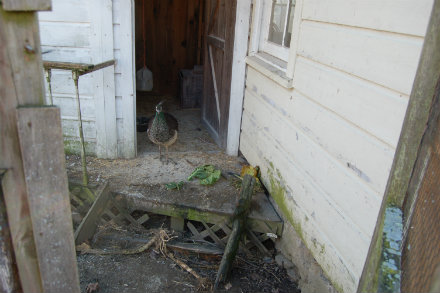
Here in the cozy warmth of our farm house, nicely insulated from what will turn out to be a major blizzard, I am thinking of frugality. Specifically my frugality. I am thinking of how well my highly frugal sense of things is suited to farm living. And wondering where on earth this frugality came from. As chief cook, and sometimes chef, I am, from meal to meal, having to make decisions about what to keep and what to discard and where. Non-food items are not the problem. When we designed our kitchen, I saw to it that we had a lower cupboard installed with a sliding tray holding four plastic recycling bins; one for glass and bottles, one for paper and cardboard, one for plastic wrappers and the like, and one for paper towels and, originally, kitchen scraps, intended for the compost pile. Once we began building our animal menagerie of sheep, chickens, turkeys, ducks, geese, cows, pigs, and peacocks, I added a copper bucket with a lid as a receptacle to receive food scraps. So I have at hand a rational framework for making decisions. It’s how to distribute the food scraps that I seem to have a kind of obsession about. What happens to the peelings and cores, the egg shells, the spoiled fruit and vegetables, the meat bones, and chicken, turkey, duck, and goose carcasses, the tea leaves and coffee grounds, the stale bread, sour yogurt, and on and on? Sometimes I find myself with a tiny handful of bread crumbs, concerned about where they should go. Even the water used to boil or blanch vegetables occasions a serious internal debate, during which “Waste not, want not” is the melody that plays in my head.
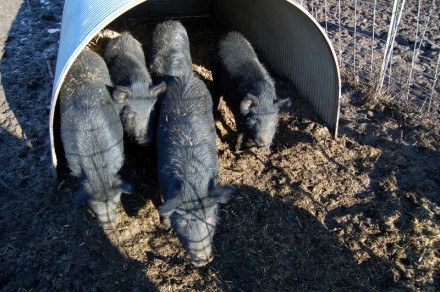
That’s why having animals is such a godsend. Knowing their needs and enthusiasms makes life so much easier. I don’t have to fret about sending off buckets of edibles to the purgatory of the landfill. Most of our kitchen refuse is destined for the pigs, who always show their appreciation. Anything we eat, apparently, is more than good enough for them. There are, however, many decisions that still need to be made. Egg shells go to the pigs to help satisfy their calcium needs. But eggshells can’t go to the chickens even though they need calcium to harden their eggshells because they would only learn bad habits. We already have enough problems with egg eating by some chickens in the coop. Instead, the chickens get the oyster and mussel shells and the occasional lobster carapace. Amazingly, it’s only a matter of weeks, and all traces of these seemingly inedible items have been pecked away. Anything green — cabbage, lettuce, and collard leaves — goes to the peafowl who, especially during this season, seem to have an insatiable appetite for anything green that comes their way. The peacock, of course, gets first choice while the peahen cadges what she can. I cannot discard the necks, bones, and carcasses of the fowl we eat even though so many cookbook recipes seem to imply that one should do just that. Instead, I boil them up (until all the goodness is in the liquid) and transfer the bare bones to the copper receptacle destined for the pigs, The stock becomes the base for a weekend lunch soup, or is frozen in plastic containers for future dishes.
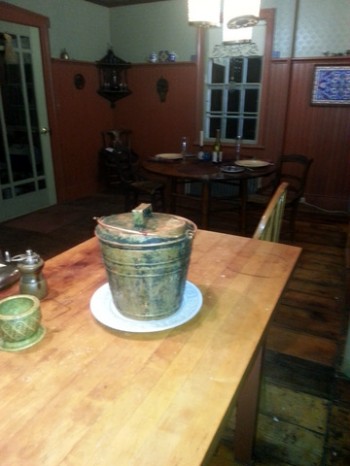
Some saved stock gets the full treatment of an Amanda Hesser recipe and becomes what the French call “autumn stock." It’s hard not to feel virtuous when something that is ordinarily thrown away demonstrates that there is, after all, such a thing as a “free lunch." Throughout the winter I specialize in what I call “fantasy never to be repeated soups," adding to a reserved stock practically all of the leftovers I happen to find in the refrigerator. Sometimes I regret that a particularly memorable soup probably cannot ever be replicated. In the last year or so, having become aware of how much goodness there is in water used to boil vegetables, I have been carefully straining that into the pig bucket. Stale bread and heels usually end up as bread crumbs and occasionally as bread pudding. Tea leaves and coffee grounds go, in warm weather (when I don’t mind stepping out the door), to the rose bushes, while in winter the grounds and leaves are likely to end up, in spite of Mark’s remonstrances, in the pig bucket. For some reason he wants to deprive them of caffeine. Where has this good housekeeping, sometimes verging on insanity, come from? It is not a new found thing dating from the last few decades when we have, as a very wasteful society, begun to learn lessons about a more sensible use of our resources. My sense of frugality may have intensified as a result of these recent cultural changes, and possibly been exaggerated as I move into my Golden Years (so-called), but I realize on reflection that frugal instincts have been with me since childhood.
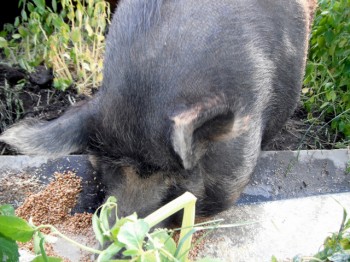
I am belatedly realizing that I have, at some level, never fully recovered from the austerity of wartime and postwar Britain when everything seemed scarce, when practically everything was rationed. I can remember hearing over and over again that bread should not be wasted, could not under any circumstances be discarded because so many men had died in the wheat convoys sailing from Canada, victims of Nazi U boat attacks. The lesson was really brought home to me when Nick, a Greek sea captain we had to dinner, not long after died in the Atlantic. I was made aware from an early age that a household was subject to a stiff fine if discarded bread was discovered in its rubbish. Consequently bread pudding, more times than I care to remember, graced the table at dessert time. Living in Turkey for a three-year period added a sacrosanct level to my concerns about bread, as by Turkish custom it is a taboo to let bread touch the ground, or to waste it in any way. If, for instance, a crust somehow finds its way onto the ground, one traditionally is required to pick it up, and place it up somewhere high for the birds. Even flour is not to touch the earth. To prevent it from doing so during bread making, for instance, special textiles called “itea” (woven just for that purpose) are placed under the bread-making area to catch any flour that escapes. In wartime Wales I was also very aware that all edible kitchen scraps were required by government regulation to be placed out at the curb for pickup in order to be carried to local farms to feed the pigs. Was this, I wonder, a prefiguration of things to come? There is more that I could say on this subject of frugality and the farm. But I have, nagging me just now, the need to decide what I should do with the tiny residue of vegetable matter that has collected in my kitchen sink strainer. When, I wonder, does virtue become a strange obsession?

